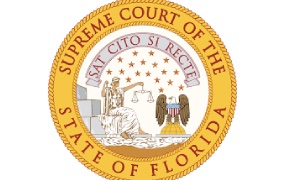WLRN Miami reports
The state Supreme Court said it will take up a dispute about whether the University of Florida should return fees to students because of a campus shutdown early in the COVID-19 pandemic — one of numerous similar cases filed in Florida and across the country.
Justices issued an order saying they will consider what is known as a “certified question of great public importance” in the potential class-action lawsuit filed by UF graduate student Anthony Rojas. The order did not set a date for arguments.
Attorneys for Rojas went to the Supreme Court in January after a divided panel of the 1st District Court of Appeal said an Alachua County circuit judge should have dismissed the lawsuit, which seeks refunds of fees paid for transportation, health-care and athletics services that were not provided because of the shutdown.
A key issue in the lawsuit — and others like it — is whether the university breached a contract with Rojas when it did not provide services linked to the fees. In the 1st District Court of Appeal’s Nov. 22 majority opinion, Judge Rachel Nordby wrote that “assorted documents attached to the complaint do not constitute an express written contract.”
As a result, she wrote that UF is shielded by sovereign immunity, a legal concept that generally protects government agencies from liability. Under sovereign immunity, agencies can face breach-of-contract lawsuits if it is shown that contracts have been violated.
“We are sympathetic to Rojas and all other students whose on-campus experiences were clipped short and rendered non-existent by the university’s response to COVID-19,” Nordby wrote in a seven-page opinion joined by Judge Lori Rowe. “And if there were a sufficient contract attached to his complaint, we would affirm the trial court (decision not to dismiss the case) without hesitation. But without such an express, written agreement … sovereign immunity bars the action.”
The Tallahassee-based appeals court, however, also asked the Supreme Court to resolve a question of great public importance about whether sovereign immunity “bars a breach of contract claim against a state university based on the university’s failure to provide its students with access to on-campus services and facilities.”
Judge Scott Makar, who was then on the 1st District Court of Appeal and is now on the 5th District Court of Appeal, dissented from the majority opinion.
“Little doubt exists that an enforceable written contract of some sort exists; if one did not, the university would have difficulty collecting tuition and fees for services because of the lack of mutuality,” he wrote.
Campuses throughout Florida and the nation were temporarily shut down in 2020 after the COVID-19 pandemic hit, with students forced to learn remotely. The UF case deals only with fees and not tuition.
State appeals courts have rejected similar lawsuits filed against Florida International University, Florida Atlantic University, Florida A&M University and Miami Dade College.
The Florida International, Florida Atlantic and Florida A&M decisions were appealed to the Supreme Court. The court, however, has put those cases on hold because of the UF lawsuit.
Meanwhile, the 2nd District Court of Appeal last year refused a request by the University of South Florida to dismiss a similar potential class-action lawsuit. The Supreme Court on Jan. 5 declined to take up an appeal by USF.
A footnote in a May decision by the 3rd District Court of Appeal in the Florida International case said the University of South Florida lawsuit “arguably relies on specific — and different — documents to determine if an express, written contract exists.”
Source:




